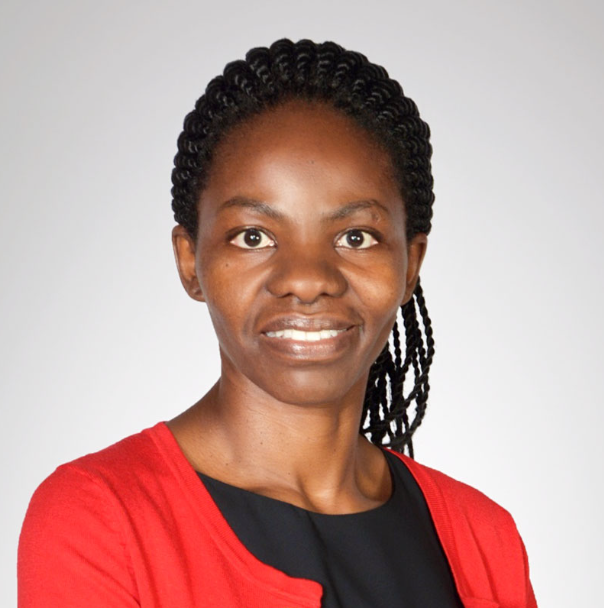
Esther Buregyeya, MBChB, PhD
Affiliated Investigator
Associate Professor
Makerere University School of Public Health, Kampala, Uganda
Dr. Esther Buregyeya is an Associate Professor and Chair of the Department of Disease Control and Environmental Health at Makerere University School of Public Health. She holds a Ph.D. in Medical Sciences from the University of Antwerp, Belgium, and a Master’s in International Health with a focus in Occupational Health from the University of Bergen, Norway.
She completed her Bachelor’s Degree in Medicine (MBChB) from Makerere University, Uganda. She has over 16 years of experience in service including clinical work in a district as a medical officer, teaching, and research. Dr. Buregyeya has a strong background in field research with 10 years of experience designing and implementing community and facility-based research, mainly in TB, HIV, and malaria.
She is also a One Health Champion formerly working with the One Health Central and Eastern Africa (OHCEA) Project-(Current AFROHUN).
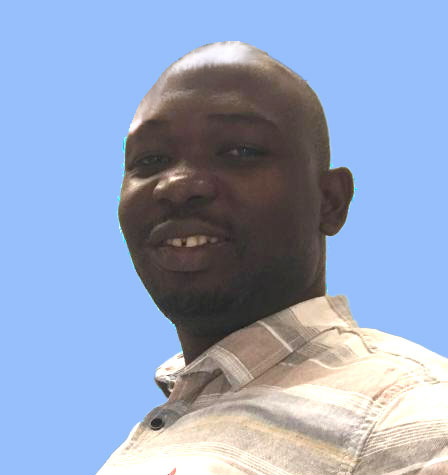
Alex Daama, MPH
PhD student Global Health
SDSU-UCSD Joint Doctoral Program in Public Health
Alex Daama is a PhD student in Public Health with a concentration in Epidemiology in the joint doctoral program at San Diego State University and the University of California, San Diego. Before transitioning to full-time doctoral studies, he served as a Program Director and Epidemiologist at the Africa Medical & Behavioral Sciences Organization (AMBSO) and previously worked with the Rakai Health Sciences Program (RHSP), contributing to HIV surveillance in the Rakai Community Cohort Study (RCCS) and HIV program implementation.
His research interests include HIV epidemic control, tobacco use, COVID-19, and non-communicable diseases. Alex has led and co-authored several scientific publications, serving as first author on more than four peer-reviewed papers and over seven conference abstracts. He has also mentored and coordinated young researchers in writing and submitting abstracts and manuscripts at AMBSO and RHSP.
Through these experiences, Alex has cultivated strong expertise in epidemiology, biostatistics, and global public health, with a focus on advancing evidence-based strategies to improve health outcomes.
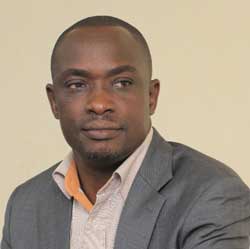
Michael Ediau, PhD
Research Scientist (Consultant)
BRIDGE
San Diego State University
School of Public Health
Researcher
Makerere University School of Public Health
Kampala, Uganda
Dr. Michael Ediau completed a Ph.D. in Public Health (Global Health) from San Diego State University and the University of California San Diego – Joint Doctoral Program in Public Health (JDP). His research interests include maternal and child health, HIV/AIDS prevention, epidemiology, health systems, monitoring and evaluation, non-communicable disease prevention, implementation science, and digital payment systems for health campaign frontline health workers. He is a research associate at the Makerere University School of Public Health (MakSPH) in Kampala, Uganda. Before joining the JDP, he was the Resident Mentor for the Master of Public Health Program at the MakSPH. He also served as a Public Health Specialist – Implementation Science with the US Centers for Disease Control & Prevention – Uganda. Before that, he worked with various organizations, implementing public health research and development interventions. He has over 15 years of accumulated working experience (including at the managerial level). Thus, his well-grounded experience combines practical field, research, program management and leadership, and academic (teaching and mentoring students) experience. As someone who was born and raised and has worked in East Africa (Uganda), he is passionate about how evidence-based public health interventions can significantly transform communities, particularly those in resource-limited settings.
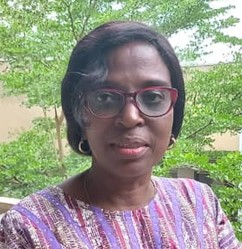
Olufunmilayo I. Fawole, MBBS, PhD
Affiliated Investigator
Professor of Epidemiology and Public Health, Faculty of Public Health, College of Medicine, University of Ibadan, Nigeria;
Adjunct Professor
School of Public Health
San Diego State University
Olufunmilayo I. Fawole is a Community Physician and Professor of Epidemiology and Public Health. Dr. Fawole is a leading researcher on gender-based violence in Nigeria. Her research has primarily focused on prevention of gender-based violence and women/ girls economic empowerment. Dr. Fawole has also conducted intervention studies to reduce experience of violence among young girls and the perpetration of intimate partner violence by boys/men, using a multi-stakeholder approach. She has published studies that assessed the impact of gender-based violence different prevention strategies among girls and young women in Nigeria. Results from her work have been used as advocacy tools by women’s groups, as well as to guide national policy. She is proactive and very efficient at working with various stakeholders and sectors involved in the gender-based violence space.

Elsa Ghebrendrias, MPH
PhD student Global Health
SDSU-UCSD Joint Doctoral Program in Public Health
Elsa Ghebrendrias is pursuing a Ph.D. in Public Health with a concentration in Global Health in the San Diego State University and University of California San Diego joint doctoral program. Her primary interest is studying the impact of systemic inequities and global policies on vulnerable populations to create and implement holistic interventions that improve health outcomes. This interest is inspired by her experiences as an East African refugee, her work in clinical and epidemiological research, and her efforts in health education within marginalized communities. She is passionate about empowering communities facing serious health challenges complicated by economic, social, and cultural barriers worldwide. Elsa worked with the County of San Diego Health and Human Services Agency’s COVID-19 pandemic response team as a contract epidemiologist.

Susan M. Kiene, PhD, MPH
Director, Building Research Initiatives Advancing Global Health Equity
Professor of Global Health
School of Public Health
San Diego State University;
Honorary Professor
Makerere University School of Public Health, Kampala, Uganda
Susan M. Kiene is a Professor of Global Health in the Division of Epidemiology and Biostatistics at San Diego State University School of Public Health. Trained in population health and experimental social and health psychology, Dr. Kiene is a social and behavioral epidemiologist who studies the multilevel (e.g., social environment, behavioral, structural) factors that affect health and inequities in access to health services among underserved and historically marginalized populations. Her research is primarily on infectious diseases (HIV, COVID-19, TB), sexual and reproductive health, alcohol and substance use, and implementation science, with a focus on developing, testing, and preparing for the scale-up of multilevel interventions to improve health and health equity. Recent research has extended this work to associated areas including stigma, mental health, and intimate partner violence. Within these research areas, Dr. Kiene incorporates digital health solutions (e.g., mobile data collection, cloud-based architecture, standardization, personalized interventions) to improve data accessibility, interoperability, and health service delivery in resource-limited settings.
As a National Institutes of Health (NIH)-funded researcher for two decades, Dr. Kiene has built collaborations with interdisciplinary researchers and communities in Uganda, Nigeria, Brazil, South Africa, and the U.S. Through this research Dr. Kiene and collaborators create opportunities for bidirectional student training and exchange opportunities. In recognition of the longstanding contributions and collaboration with Makerere University School of Public Health in Uganda, Dr. Kiene is appointed as an Honorary Professor.
Before joining SDSU’s School of Public Health in 2015, Dr, Kiene was faculty at the University of Connecticut School of Medicine from 2011-2014 and at Brown University from 2007-2011, where she remains an adjunct faculty member in the School of Public Health.
Having been a first-generation college student, Dr. Kiene is passionate about mentoring students and junior researchers.
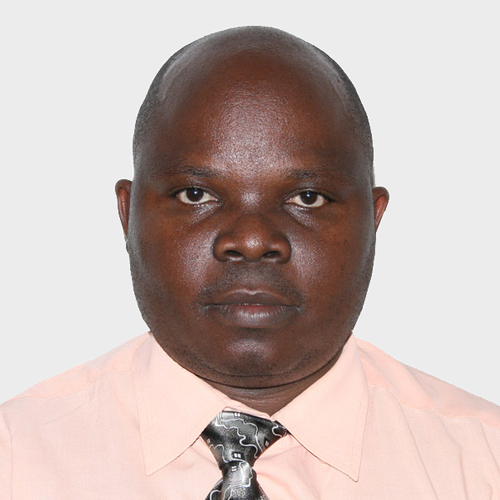
Joseph KB Matovu, MHS, PhD
Affiliated Investigator
Associate Professor
Busitema University
Faculty of Health Sciences
Mbale, Uganda
Senior Research Associate
Makerere University
School of Public Health
Kampala, Uganda
Dr. Joseph KB Matovu is an Associate Professor of Social and Behavioral Epidemiology in the Department of Community and Public Health at Busitema University Faculty of Health Sciences, Mbale, Uganda, and a Senior Research Associate in the Department of Disease Control and Environmental Health at Makerere University School of Public Health, Kampala, Uganda. He holds a Ph.D in Public Health from Makerere University; a Master of Health Science in International Health (with a bias in Social and Behavioral Interventions) from the Johns Hopkins Bloomberg School of Public Health, Baltimore, MD, USA; and a Bachelor of Arts in Social Work and Social Administration (SWSA) from Makerere University, Kampala, Uganda.
Dr. Matovu has >25 years of experience in the design and implementation of social, behavioral, and epidemiologic research; he is the author of 126 peer-reviewed scientific papers; he is a peer reviewer for many international scientific journals; he is an Associate Editor with AIDS and Behaviour and BMC Public Health journals; and he is an Academic Editor with PLoS ONE.
His areas of research interest include social and behavior change communication, HIV prevention research, impact/program evaluation, and implementation science research. Dr Matovu is a member of the HIV self-testing taskforce at the Ministry of Health and a member of the Uganda AIDS Commission’s Prevention Technical Working Group (PTWG). As a member of the PTWG, Dr Matovu led the writing of the ‘HIV prevention thematic area’ in two National HIV and AIDS Strategic Plans (i.e., the one for 2015/16 – 2019/20 and 2020/21 – 2024/25). Dr. Matovu is passionate about the integration of social and behavioural sciences into epidemiologic research. His research has particularly focused on married couples, men, adolescent girls and young women, adolescent boys and young men, female sex workers, truck drivers, and men who have sex with men.
Dr Matovu has just completed his EDCTP-funded Career Development Fellowship (CDF) in which he assessed the impact of a peer-led HIV self-testing intervention (PEST4MEN) on HIV testing uptake and linkage to HIV care among men in two fishing communities in Kalangala and Buvuma island districts. The PEST4MEN intervention was a follow-up on a similar intervention in Kasensero fishing community. Previously, Dr Matovu was part of a team that evaluated the impact of secondary HIV self-testing interventions on HIV testing uptake among men. This cluster-randomized cluster intervention trial, implemented with funding from the International Initiative for Impact Evaluation (3ie), targeted pregnant women receiving antenatal care services at three health facilities in central Uganda (Nakaseke Hospital, Mpigi Health Center IV, and Entebbe General Hospital).

Amanda P. Miller, PhD, MS
Investigator
Assistant Professor
Division of Global Health Policy and Management
School of Public Health
San Diego State University
Dr. Amanda Miller is a global health researcher whose work focuses on the intersection of alcohol use, HIV, mental health, and intimate partner violence, with a particular emphasis on implementation science and health systems strengthening in low-resource, high-need settings. Her research examines how behavioral and structural interventions can be adapted and scaled to improve access to mental health and substance use services, reduce HIV risk, and strengthen maternal and child health outcomes. She is currently supported by a National Institutes of Health career development award (K01) to build expertise in adapting and implementing interventions that are contextually grounded and designed to address the unique challenges of complex, low-resource settings. Dr. Miller’s broader research agenda includes scaling multilevel interventions for behavioral health, integrating behavioral health (substance use and mental health services) into HIV and maternal health services, and bridging research to policy through strong, equitable global partnerships. She is also passionate about training the next generation of global health leaders and serves as core faculty for SDSU’s Doctor of Public Health Program.
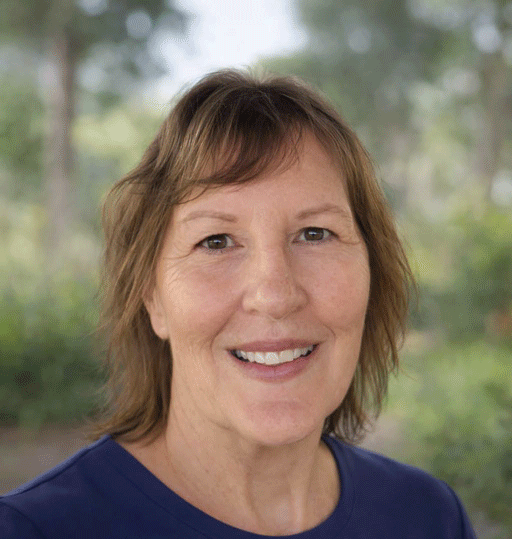
Jamie Moody, MS
Research Manager for BRIDGE
San Diego State University
School of Public Health
Jamie Moody has worked as a research manager with the SDSU School of Public Health in Health Promotion and Global Health for over 25 years. Most of her work has been with community-based research promoting health equity in vulnerable communities. Her experience is highly diverse, encompassing the development of academic and community collaborations, preparation of grant proposals, recruitment and training of student interns from middle school to doctoral levels across various disciplines and universities, and the creation and implementation of community interventions. Jamie was a first-generation college student from a small Midwest rural community. Prior to working in research, she worked as a recreation therapist and a counselor for troubled adolescents.
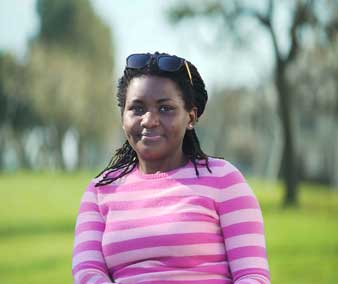
Rose Naigino, PhD
San Diego State University
School of Public Health
Dr. Rose Naigino holds a PhD in Public Health with a concentration in Global Health from San Diego State University (SDSU) and the University of California San Diego (UCSD). She brings over a decade of experience managing and coordinating NIH-funded HIV research in Uganda, involving diverse subgroups such as pregnant women, fishing communities, and adolescent girls and young women. Her work focuses on the intersection of alcohol use, HIV, and mental health among adolescent girls and young women in low-income settings. With more than 20 peer-reviewed publications, including three as first author, Dr. Naigino is pursuing postdoctoral training to strengthen her path toward becoming an independent researcher in global HIV prevention research.

Ijeoma Nwabuzor Ogbonnaya,
MSW, PhD
Affiliated Investigator
Associate Professor
Arizona State University
Phoenix, AZ, USA
Dr. Ijeoma Nwabuzor Ogbonnaya is an Associate Professor in the School of Social Work at Arizona State University. Her research investigates how intimate partner violence (IPV) and IPV services impact health and well-being and how this impact varies across culture, race, and ethnicity. She focuses on populations most vulnerable to IPV, including child welfare system-involved families and people living with HIV. She is the recipient of fellowships through the National Institute on Drug Abuse (NIDA) and the National Institute of Mental Health (NIMH). She received an NIMH Diversity Supplement to study HIV-related outcomes of women living with HIV in rural Uganda who have experienced IPV and a National Institute on Minority Health and Health Disparities (NIMHD) grant to develop and pilot test a savings group intervention to reduce IPV and depression among young mothers formerly in foster care (sub-project to U54MD002316). She also conducted a feasibility study funded through ASU Watts College. This study aimed to understand if using myPlan, an online risk-informed safety planning intervention, has the potential to assist child welfare caseworkers in intervening appropriately in cases involving IPV. Currently, she is implementing a study in Wakiso District, Uganda to develop and pilot test a couples-based intervention to help adolescent girls and young women living with HIV (15-24 years) access HIV care and improve the outcomes of their HIV treatment by targeting male partner alcohol use to reduce IPV risk. This study is funded by the National Institute on Alcohol Abuse and Alcoholism (NIAAA) (R34AA030489).

Omowumi O. Okedare, BSc, MSc, PhD
Affiliate Investigator
Recent PhD Graduate, Researcher
Faculty of Public Health
University of Ibadan, Nigeria
Omowumi O. Okedare is a public health researcher and consultant with expertise in gender-based violence, adolescents and women’s health, especially those in urban slums and low-income settings. Omowumi has competence in community mobilization, research planning, implementation and evaluation, and data management. She is skilled in conducting both quantitative and qualitative research. Her Ph.D. research focused on how experience of intimate partner violence affects the quality of life of young women in urban slums and non-slums. She is interested in showing through her research how poverty is interlinked with adolescents’ and women’s health, including intimate partner violence.

Elizabeth Reed, ScD, MPH
Investigator
Professor of Global Health
School of Public Health
San Diego State University
Dr. Elizabeth Reed is a Professor of Global Health at San Diego State University and Adjunct Associate Professor of Medicine at the University of California, San Diego. Trained in social epidemiology, she conducts research related to the intersection of gender inequality, poverty, and health. Specifically, she focuses her research on the social and economic factors influencing gender-based violence and sexual/reproductive health outcomes, including HIV/STI as well as adolescent and unintended pregnancy. She uses the findings of her research to support the development of public health programming to promote economic opportunity, health, and safety. Her research is based in the US, Latin America, South Asia, and Africa.
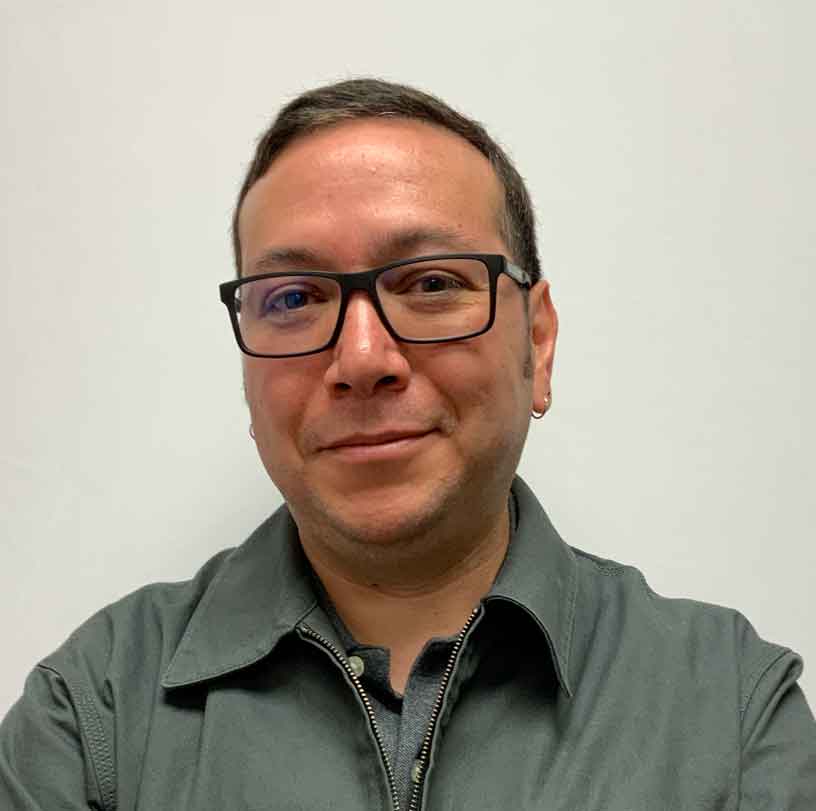
Carlos Rivera Saldaña, PhD, MSc
Research Scientist
BRIDGE
San Diego State University
School of Public Health
Dr. Carlos Rivera Saldaña is a Research Scientist at the Building Research Initiatives Advancing Global Health Equity (BRIDGE) Lab at San Diego State University (SDSU). He recently completed a postdoctoral fellowship in the NIH T-32 Training Program in Research on Addictions in Interdisciplinary NeuroAIDS (TRAIN) at UC San Diego. He holds a Ph.D. in Global Health from the SDSU-UCSD Joint Doctoral Program and a Master’s in Social Policy and Development Economics from the London School of Economics and Political Science (LSE), United Kingdom. He earned his Bachelor’s Degree in Economics from the Instituto Tecnológico Autónomo de México (ITAM).
Before his doctoral training, Dr. Rivera Saldaña worked as a community outreach worker at Boston Health Care for the Homeless Program. As an economist and social policy consultant, he contributed to international projects, primarily in Mexico, where he collected primary data and conducted community needs assessments to inform policy proposals addressing income inequality, disparities in access to health services, and food security.
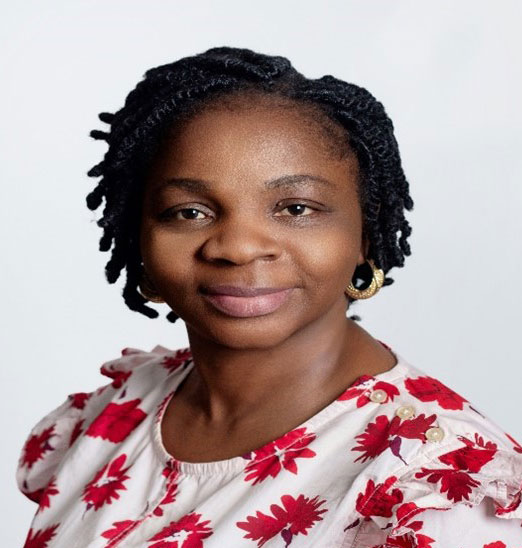
Mobolaji M. Salawu, MBBS, MPH
Affiliate Investigator
Assistant Professor
Faculty of Public Health, College of Medicine
University of Ibadan, Nigeria
Mobolaji M. Salawu is a Public Health Physician and an Epidemiologist. Dr Salawu is passionate about the health and wellbeing of women and girls. Her research work focuses on infectious disease epidemiology, sexual and reproductive health, and prevention of violence against women and girls. Her recent research work highlights reduction of intimate partner violence among in school adolescent girls using mobile application, in addition, she assessed the association between intimate partner violence and abortion among ever-partnered women in Nigeria. Her capacity building includes training on main-streaming gender issues into academic activities for prevention of violence, intersectional analysis in research and use of digital technologies in healthcare. Her research works seek to promote and improve the health and wellbeing of women and girls in Nigeria. Dr Salawu is a member of the inaugural cohort of the Gender Equity/GBV Evidence Accelerator Fellowship at the Johns Hopkins Center for Global Women’s Health and Gender Equity.
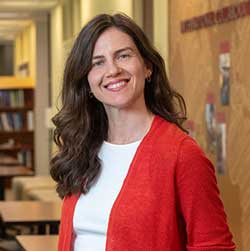
Katelyn Sileo, PhD, MPH
Affiliated Investigator
Associate Professor
Boston College
Boston, MA, USA
Dr. Katelyn (Katy) Sileo is an Associate Professor at the Connell School of Nursing and faculty in the Program for Global Public Health and the Common Good at Boston College. She is trained in global public health, with a geographic focus on sub–Saharan Africa. Her research aims to understand and intervene on multilevel determinants of sexual and reproductive health inequities, with a particular interest in the intersection of gender norms and health outcomes in global settings. Her current work focuses on using community-engaged and mixed methods to develop and evaluate gender-transformative behavioral and health system interventions to improve HIV and family planning outcomes in Uganda.
Prior to joining Boston College, Dr. Sileo was faculty at the University of Texas at San Antonio. She received her Ph.D. in Global Public Health from San Diego State University and the University of California San Diego’s Joint Doctoral Program in Global Health. She was a 2014-2017 NIDA Fellow in HIV/AIDS and substance abuse at the University of California San Diego, a 2016-2017 NIH Fogarty Global Health Fellow, and a 2017-2019 postdoctoral fellow in the Yale AIDS Prevention Training Program (Y-APT) in the Center for Interdisciplinary Research on AIDS at Yale University.

Doreen Tuhebwe, MPH
PhD student Global Health
SDSU-UCSD Joint Doctoral Program in Public Health
Doreen Tuhebwe is pursuing a Ph.D. in Public Health with a concentration in Global Health in the San Diego State University and the University of California San Diego joint doctoral program. Her research interests include: 1) disease control and equity in service delivery focusing on HIV among high-risk groups such as fishing communities; 2) understanding drivers of vulnerability such as alcohol use, urbanicity, poverty and climate change, and 3) public health intervention optimization through client preference modeling, people-centered design and community engagement. She is also interested in working with adolescent girls and young women, teaching and student mentorship. She has over 7 years of experience writing research protocols, monitoring field work and experiments, and conducting ethnographic studies resulting in over 20 publications in peer-reviewed scientific journals. Doreen is a founding member of the Women in Global Health-Uganda Chapter and the Makerere University-Master of Public Health Alumni Association, Uganda.

Adriane Wynn, PhD
Affiliated Investigator
Assistant Professor
University of California San Diego
School of Medicine
San Diego, CA, USA
Dr. Adriane Wynn is an Assistant Professor in the Division of Infectious Diseases and Global Public Health at the University of California San Diego. Her research interests are related to diagnosing and managing sexually transmitted infections, with a focus on assessing costs, benefits, and cost-effectiveness of interventions. She is also the Principal Investigator of a K01 award through the National Institute on Alcohol Abuse and Alcoholism, which supports training on the relationships between alcohol use and HIV as well as integrating infectious disease modeling with cost-effectiveness analysis. Dr. Wynn received her PhD in Health Policy and Management at the University of California Los Angeles (UCLA).
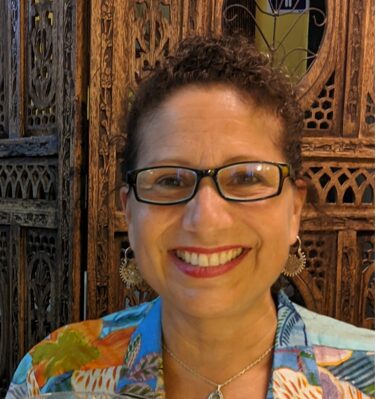
María Luisa “Mari” Zúñiga, PhD
Investigator
Professor, School of Social Work
Co-Director, SDSU-UCSD Joint Doctoral Program in Interdisciplinary Research on Substance Use
San Diego State University
San Diego, CA, USA
Dr. Zúñiga is professor in the School of Social Work at San Diego State University (SDSU). She serves as the Campus Director of the SDSU-UCSD Joint Doctoral Program in Interdisciplinary Research on Substance Use. She is Co-Principal Investigator and Faculty Development Core Director of the NIH-funded SDSU FUERTE Program, (Faculty United towards Excellence in Research and Transformational Engagement, U54CA267789) and Co-Principal Investigator and Co-Director of the Faculty Development Program “Addiction Scientists Strengthened through Education and Training” (ASSET, R25DA050724) focused on supporting Black and/or Latinx junior faculty. Trained as an epidemiologist, she is a public health researcher with over 20 years of experience in community-based participatory research with communities impacted by migration and communities in the U.S.-Mexico border region. She studies health disparities and healthcare access among vulnerable populations, including Latinx and other minority communities, populations who use substances, and those living with HIV. Her international research collaborations include ongoing work in México and Brazil. Throughout her academic career, she has cultivated expertise in research training of early-stage investigators and creating and supporting academic and research climates and communities that nurture, at their core, diversity and inclusive excellence.
Over the last 20 years Dr. Zúñiga has mentored over 44 junior faculty, 32 (73%) of whom are underrepresented in health-related research; 43 PhD students, 23 of whom are underrepresented; and nine post-doctoral fellows, six from underrepresented groups. Her own background as a Latinx faculty and researcher and over 20 years of experience as a mentor to underrepresented junior faculty gives her an in-depth understanding of how to lead system-level efforts to support scientific workforce diversity.
PhD program in Interdisciplinary Research on Substance Use (IRSU). ASSET. SDSU FUERTE.
